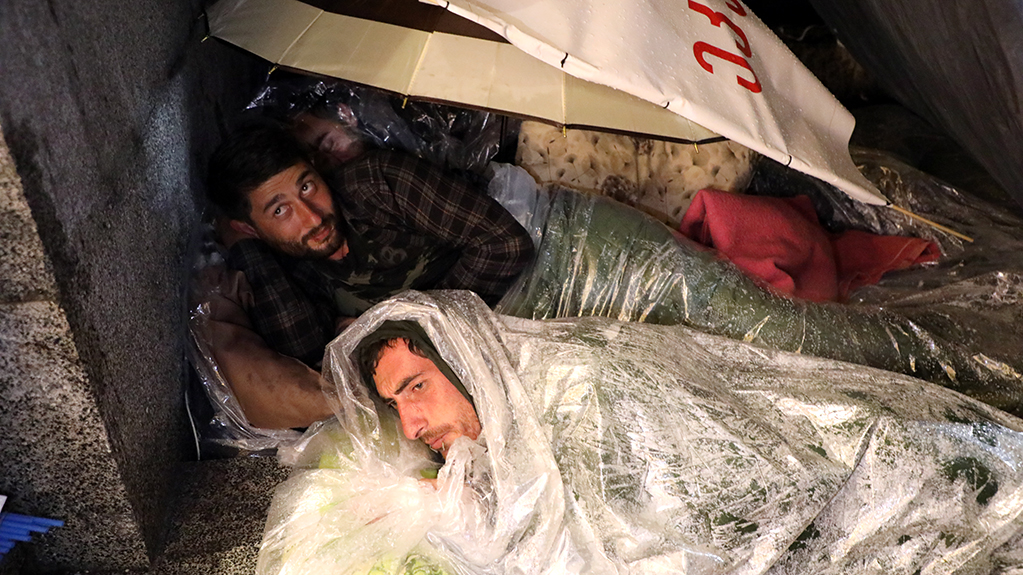Tbilisi City Court Judge Valerian Pilishvili denied the request of the starving Shukrutians to set up a tent in front of the Parliament building. The participants of the rally demanded that the court issue a temporary ruling ordering the Ministry of Internal Affairs not to interfere with the police and to allow them to set up their tents.
News
5 participants in the protest have been on hunger strike since September 1. Their health is deteriorating daily, with their blood glucose levels critically low. They complain of dizziness, weakness, and headaches. On September 17, 28-year-old Jambul Macharashvili was taken to the hospital by an emergency medical team. After his first infusion, as soon as he was able to stand, he returned to the parliament.
The Shukruti protesters have been demanding permission to set up a tent in front of the parliament building since September 11, after moving from Chiatura to Tbilisi on the 183rd day of their continuous protest to draw the attention of the central government, politicians, human rights organizations, and the media.
The police did not allow them to pitch a tent in front of the parliament building.
"I can't let you in. This is not the hotel you burned. I can't let you pitch a tent or anything in front of the parliament building. Appeal to the relevant authorities,"
explained Lasha Jokhadze, head of the Tbilisi Main Division of the Patrol Police Department, when refusing the protesters' request.
Initially, the protesters were not even allowed to bring warm clothes and underwear to the parliament building, leaving the starving participants to sleep on the bare concrete.
On the evening of September 17, heavy rain fell in Tbilisi. Despite the downpour, around twenty police crews remained vigilant, ensuring that the hunger strikers did not set up their tents. The rain lasted for over an hour, leaving the protesters soaked. As doctors say,
The worsening weather conditions, particularly the drop in temperature, could further deteriorate the health of the hunger strikers, especially affecting their respiratory systems.
On September 18, Giorgi Bitsadze, Jumber Tsutskiridze, Jambul Macharashvili, Amiran Shekiladze, Zviad Papidze, Janiko Labadze, Bekar Neparidze, and other participants in the rally, with the assistance of the Civil Advocacy Center, applied to the Tbilisi City Court with two requests:
- They sought a declaration that the actions taken by the Ministry of Internal Affairs on September 11, 12, 13, 14, 15, 16, and 17, 2024, which prohibited the plaintiffs from placing a tent in front of the Parliament building on Rustaveli Avenue in Tbilisi, were illegal. They argued that this prohibition restricted the proper and full realization of their constitutionally guaranteed right to assembly and expression.
- They requested that the Ministry of Internal Affairs be ordered to refrain from interfering with their rights and to allow them the opportunity to set up a tent in front of the Parliament building, thereby ensuring that their constitutional rights to gather and express themselves would be fully realized.
In the same lawsuit, the plaintiffs petitioned the court for a temporary ruling, asking the Ministry of Internal Affairs to refrain from taking action, specifically requesting that the police not interfere with them and that they be allowed to place a tent in front of the Parliament building.
The court accepted the lawsuit on the same day but did not entertain the motion for a temporary ruling.
Judge Valerian Pilishvili stated in the ruling, "The claimant's motion does not demonstrate that the construction needed for the tent is safe and that its presence will not pose a threat to the lives and health of others in the event of further escalation of the situation."
Vladimer Kutateladze, the lawyer representing the protest participants and a lawyer from the Civil Advocacy Center, explains that Judge Pilishvili did not consider the court's consistent practice in his ruling.
Placing a tent is part of the constitutional rights to assembly and expression, and both the city, appellate, and even the Supreme Court have ruled on this issue several times.
On August 31, 2016, the Tbilisi City Court determined that setting up a tent without prior consent does not violate the right to peaceful assembly. The court explained that "the right to assembly and demonstration includes the right to choose the place, time, form, and content of the assembly, which includes the possibility of placing temporary structures."
The Supreme Court, which establishes consistent legal practice in the country, clarified in its 2018 decision:
"The Court of Cassation believes that the Appeals Chamber did not correctly interpret the opinion of the Court of First Instance regarding the notion that a tent has no symbolic or expressive value. Moreover, placing a tent is not an unnecessary means for exercising the right to assembly, as Article 25 of the Constitution protects the right, which allows individuals to choose the form, means, and place of expression at their discretion. Specifically, a person has the right, guaranteed by law, to publicly and peacefully express their opinion in any part of the street and in whatever form they consider appropriate. Expressing an opinion can be done not only through speech or statements but also in silent forms or by building temporary constructions, provided it does not violate applicable legislation."
The Constitutional Court of Georgia has highlighted the possibility of arranging temporary constructions during gatherings and demonstrations in several decisions. In a 2011 decision, the Constitutional Court emphasized that the prohibition of placing temporary constructions by assembly participants is permissible only when it involves blocking the carriageway, in the context of the legitimate goal of protecting the rights of others. According to the court, "the participants in the assembly themselves determine the form that best expresses the purpose of the gathering."
According to the lawyer, the Tbilisi City Court's decision will be appealed to the Court of Appeal.















